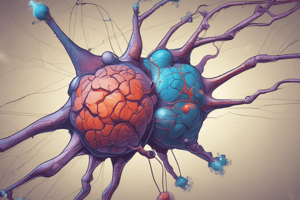Podcast
Questions and Answers
What is the physiological role of COX-1 in the stomach?
What is the physiological role of COX-1 in the stomach?
- Reduces the formation of gastric mucosa and promotes peptic ulcer
- Stimulates gastric acid secretion and decreases gastric blood flow
- Has no significant role in stomach physiology
- Inhibits gastric acid secretion and enhances the formation of gastric mucosa (correct)
What is the physiological role of COX-1 in platelets?
What is the physiological role of COX-1 in platelets?
- Has no effect on platelet function
- Increases platelet aggregation and causes vasoconstriction (correct)
- Inhibits platelet aggregation and prevents clot formation
- Promotes bleeding time and clot formation
What is the physiological role of COX-2 in the kidney?
What is the physiological role of COX-2 in the kidney?
- Promotes renal vasoconstriction & decreases renal blood flow
- Important for the maintenance of renal blood flow & normal renal function (correct)
- Has no significant role in kidney physiology
- Induces inflammation & impairs renal function
What is the main difference between COX-1 and COX-2?
What is the main difference between COX-1 and COX-2?
What are the clinical indications of NSAIDs?
What are the clinical indications of NSAIDs?
Which enzyme is responsible for maintaining renal blood flow and normal renal function?
Which enzyme is responsible for maintaining renal blood flow and normal renal function?
What is the physiological role of COX-1 in platelets?
What is the physiological role of COX-1 in platelets?
What is the primary function of COX-1 in the stomach?
What is the primary function of COX-1 in the stomach?
Which COX isoenzyme is responsible for inflammation, fever, and pain?
Which COX isoenzyme is responsible for inflammation, fever, and pain?
5
5
Flashcards are hidden until you start studying




